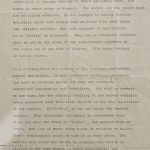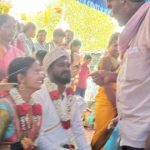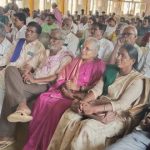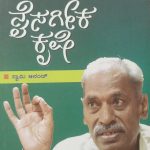Amasa – Devanoor Mahadeva
[Short story ‘Amasa’ witten by Devanura Mahadeva, Translated by-A.K.Ramanujan and Manu Shetty Published in- Knit India Through Literature, Volume-1, The South, 1998. And Devanuru Mahadeva’s, “AMASA” short story, English translation published in 19 November 2021 “FRONTLINE” magazine. Story selected by Mini Krishnan, Reproduced by permission of Penguin Books India. The story “Amasa” features in “The Penguin Book Of Modern Indian Short Stories”. Edited by Stephen Alter and Wimal Dissanayake (Penguin Books 1989) Thanx to Lecturer V.L.Narasimha murthy for sending the story to nammabanavasi. ದೇವನೂರ ಮಹಾದೇವ ಅವರು ಬರೆದ ‘ಅಮಾಸ’ ಕಿರುಕಥೆಯನ್ನು ಅನುವಾದಿಸಿದವರು-ಎ.ಕೆ.ರಾಮಾನುಜನ್ ಮತ್ತು ಮನು ಶೆಟ್ಟಿ ಇದು ನಿಟ್ ಇಂಡಿಯಾ ಥ್ರೂ ಲಿಟರೇಚರ್, ಸಂಪುಟ-1, ದಿ ಸೌತ್, 1998, ನಲ್ಲಿ ಪ್ರಕಟಗೊಂಡಿದ್ದು, ಈ ಸಣ್ಣ ಕಥೆಯು, 19 ನವೆಂಬರ್ 2021ರಂದು “FRONTLINE” ನಿಯತಕಾಲಿಕದಲ್ಲಿ ಮರು ಪ್ರಕಟವಾದ ಇಂಗ್ಲೀಷ್ ಅನುವಾದವಾಗಿದೆ. ಮಿನಿ ಕೃಷ್ಣನ್ ಆಯ್ಕೆ ಮಾಡಿದ ಈ ಕಥೆಯು , ಪೆಂಗ್ವಿನ್ ಬುಕ್ಸ್ ಇಂಡಿಯಾದ ಅನುಮತಿಯಿಂದ ಪುನರುತ್ಪಾದಿಸಲಾಗಿದ್ದು, ಕಥೆಯು “ದಿ ಪೆಂಗ್ವಿನ್ ಬುಕ್ ಆಫ್ ಮಾಡರ್ನ್ ಇಂಡಿಯನ್ ಶಾರ್ಟ್ ಸ್ಟೋರೀಸ್” ನಲ್ಲಿದೆ. ಸ್ಟೀಫನ್ ಆಲ್ಟರ್ ಮತ್ತು ವಿಮಲ್ ಡಿಸಾನಾಯಕೆ ಇದನ್ನು ಸಂಪಾದಿಸಿದ್ದಾರೆ (ಪೆಂಗ್ವಿನ್ ಬುಕ್ಸ್ 1989)ಕಥೆಯನ್ನು ನಮ್ಮಬನವಾಸಿಗೆ ಕಳುಹಿಸಿದ ಉಪನ್ಯಾಸಕರಾದ ವಿ.ಎಲ್.ನರಸಿಂಹ ಮೂರ್ತಿ ಅವರಿಗೆ ಧನ್ಯವಾದಗಳು.]
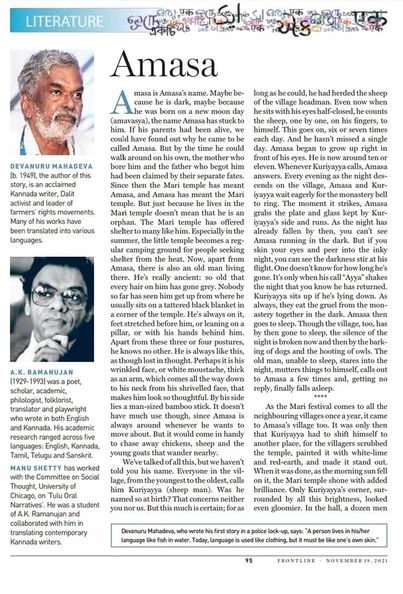
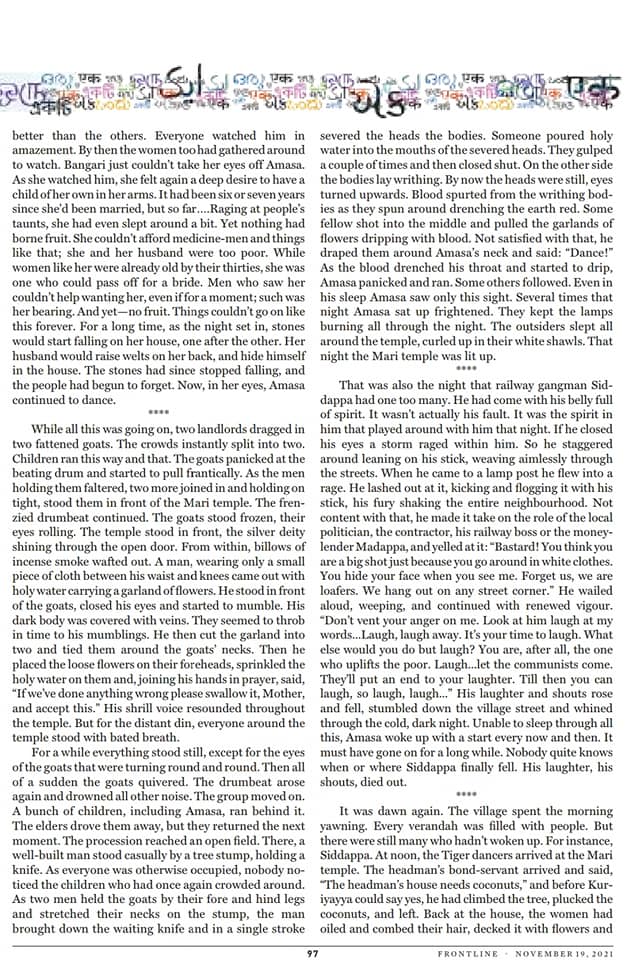
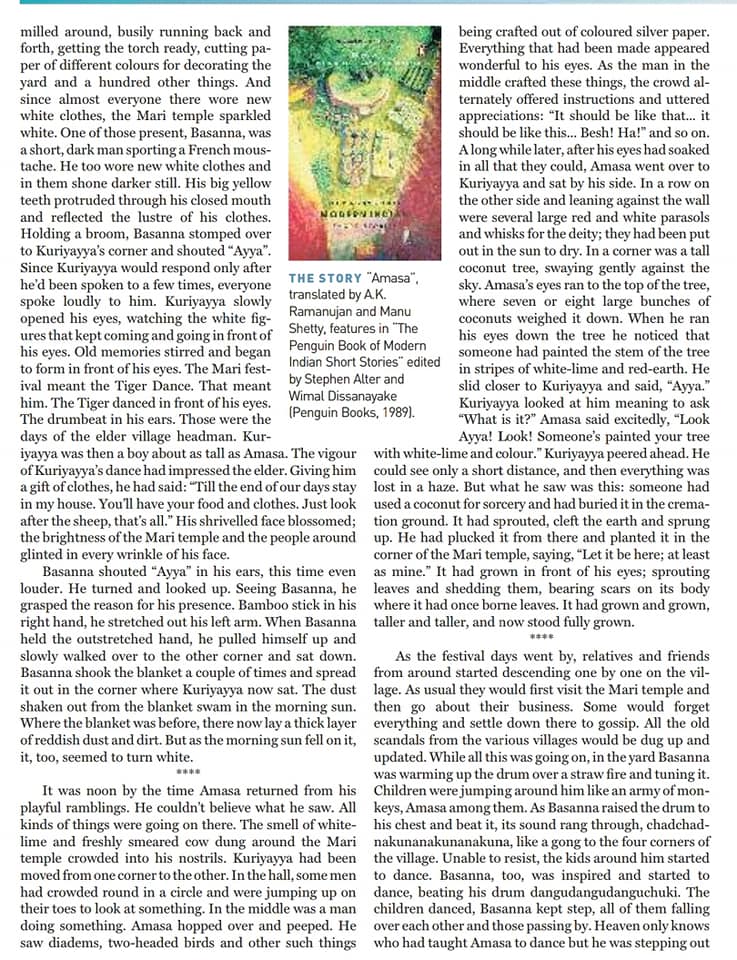
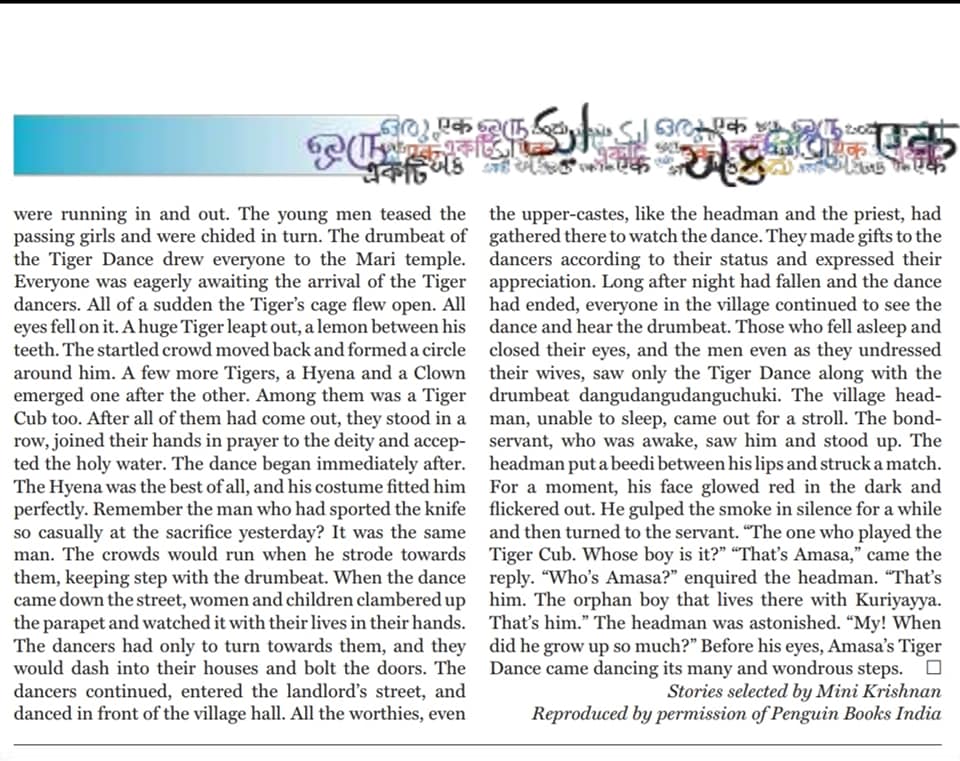 Amasa is Amasa’s name. May be because he is dark, may be because he was been born on a new moon day (amavasya), the name Amasa has stuck to him. If his parents had been alive, we could have found out why he came to be called Amasa. But by the time he could walk around on his own, the mother who bore him and the father who begot him had been claimed by their separate fates. Since then the Mari temple has meant Amasa, and Amasa has meant the Mari temple. But just because he lives in the Mari temple, it doesn’t mean that he is an orphan. The Mari temple has offered shelter to many like him. Especially in the summer, the little temple becomes a regular camping ground for people seeking shelter from the heat. Now, apart from Amasa, there is also an old man living there. He’s really ancient. So old that every hair on him, on his head, body and limbs, has gone grey. Nobody so far has been him get up from where he usually sits. In a corner of the temple is spread tattered, black blanket, nobody knows how old. He’s always sitting on it, feet stretched before him, or leaning on pillar, or with his hands behind him, Apart from these three or four postures, he doesn’t seem to know of any other. It has somehow become his habit to sit like this, his eyes half-closed. He never sits any other way. Sitting like this, he looks as though he were lost in thought. Maybe it is his face, all wrinkled, that makes him look so thoughtful. Or perhaps it is his white moustache, thick as an arm, which comes all the way down to his neck from his side. There is always a man-sized bamboo stick. It doesn’t have much use though, since Amasa is alwaly around whenever he wants to move about. But it would come in handy to chase away the hens, the sheep and the young goats that wander nearby.
Amasa is Amasa’s name. May be because he is dark, may be because he was been born on a new moon day (amavasya), the name Amasa has stuck to him. If his parents had been alive, we could have found out why he came to be called Amasa. But by the time he could walk around on his own, the mother who bore him and the father who begot him had been claimed by their separate fates. Since then the Mari temple has meant Amasa, and Amasa has meant the Mari temple. But just because he lives in the Mari temple, it doesn’t mean that he is an orphan. The Mari temple has offered shelter to many like him. Especially in the summer, the little temple becomes a regular camping ground for people seeking shelter from the heat. Now, apart from Amasa, there is also an old man living there. He’s really ancient. So old that every hair on him, on his head, body and limbs, has gone grey. Nobody so far has been him get up from where he usually sits. In a corner of the temple is spread tattered, black blanket, nobody knows how old. He’s always sitting on it, feet stretched before him, or leaning on pillar, or with his hands behind him, Apart from these three or four postures, he doesn’t seem to know of any other. It has somehow become his habit to sit like this, his eyes half-closed. He never sits any other way. Sitting like this, he looks as though he were lost in thought. Maybe it is his face, all wrinkled, that makes him look so thoughtful. Or perhaps it is his white moustache, thick as an arm, which comes all the way down to his neck from his side. There is always a man-sized bamboo stick. It doesn’t have much use though, since Amasa is alwaly around whenever he wants to move about. But it would come in handy to chase away the hens, the sheep and the young goats that wander nearby.
We’ve talked of all this, but we haven’t told you his name. Everyone in the village, from the youngest to the oldest, calls him Kuriyayya, Kuriyayya (Sheep Man). Was he named so at birth? That concerns neither you nor us. But this much is certain, from the day he could stand on his own feet to the day his feet could no longer walk, he had herded the sheep of the village headman. Even now when he sits with his eyes half-closed, he counts the sheep, one by one, on his fingers, to himself. This goes on, six or seven times each day. And he hasn’t missed a single day. Amasa began to grow up right in front of his eyes. He is now around ten or eleven. Whenever Kuriyayya calls, Amasa answers. Every evening as the night descends on the village, Amasa grabs the plate and glass kept by Kuriyayya’s side and runs. As the night has already fallen by then, you can’t see Amasa running in the dark. But if you skin your eyes and peer into the inky night, you can see the darkness stir at his flight. One doesn’t know for how long he’s gone. It’s only when his call ‘Ayya’ shakes the night that you know he has returned. Kuriyayya sits up if he’s lying down. As always they eat the gruel from the monastery together in the dark. Amasa then goes to sleep. Though the village too has by then gone to sleep, the silence of the night is broken now and then by the barking of dogs and the hooting of owls. The old man unable to sleep stares into the night, mutters things to himself, calls out to Amasa a few times and, getting no reply, finally falls asleep.
As the Mari festival comes to all the neighbouring villages once a year, it came to Amasa’s village too. It was only then the Kuriyayya had to shift himself to another place, for the villagers scrubbed the temple, painted it with white lime and red-earth, and made it stand out. When it was done, all sides freshly painted in stripes of white lime and red-earth, and as the morning sun fell on it, the Mari temple shone with an added brilliance. Only Kuriyayya’s corner, surrounded by all this brightness, looked even gloomier. In the hall, a dozen men milled around, busily running back and forth, getting the torch ready, cutting paper of different colours for decorating the yard and a hundred other things. And since almost everyone there wore new white clothes, the Mari temple sparkled in whiteness. One of those present, Basanna, was a short, dark man sporting a French moustache. He too wore new white clothes and in them he shone darker stil. His big yellow teeth protruded through his closed mouth and reflected the lustre of his clothes. In his hand he held a broom. Basanna stomped over to Kuriyayya’s corner and shouted ‘Ayya’. Since Kuriyayya would respond only after he’d been spoken to a few times, everyone, spoke loudly to him. Kuriyayya slowly opened his eyes and looked. He watched the wite figures that kept coming and going in front of his eyes. As he watched, his old memories stirred and began to form in front of his eyes. The drumbeat in his ears. Those were the days of the elder village headman. Kuriyayya was then a boy about as high as Amasa. The vigour of Kuriyayya’s dance had impressed the elder. Giving him a gift of clothes, he had said: “Till the end of your days stay in my house. You’ll have your food and clothes. Just look after the sheep, that’s all. His shriveled face blossomed; the brightness of the Mari temple and the people around glinted in every wrinkle of his face. Basanna shouted ‘Ayya’ in his ears, this time even louder. He turned his head and looked up. Seeing Basanna, he grasped the reason for his presence. With the bamboo stick in his right hand, he stretched out the other. When Basanna held the outstretched hand, he pulled himself up and slowly walked over to the other corner leaning on the stick and sat down. Basanna shook the blanket a couple of times and spread it out in the corner where Kuriyayya was now sitting. The dust shaken out from the blanket swam in the morning sun. Where the blanket was before, there now lay a thick layer of reddish dust and dirt. But as the morning sun fell on it, it too seemed to turn white.
* * *
It was noon by the time. Amasa returned from his playful ramblings. He couldn’t believe what he saw. All kinds things were going on there. The smell of whitelime, of raw earth, and freshly smeared cowdung around the Mari temple crowded into his nostrils. Kuriyayya had been moved from one corner to the other. In the hall, some men had crowded round in a circle and were jumping up on their toes to look at something. In the middle was a man doing something. Amasa hopped over and peeped. He saw diadems, two-headed birds and other such things being crafted out of coloured silver paper. Everything that had been made there seemed wonderful to his eyes. As the man in the middle crafted these things, the crowd alternately offered instructions and uttered appreciations; ‘It should be like that…It should be like this… Besh! Ha! ‘and so on. A long while later, after his eyes had soaked in all that they could, Amasa went over to Kuriyayya and sat by his side. In a row on the other side and leaning against the wall were several large red and white parasols and whisks for the deity; they had been put out in the sun to dry. In a nearby corner was a tall coconut tree, gently swaying against the sky. Amasa’s eyes ran up to the top of the tree, where seven or eight large bunches of coconuts weighed it down. When he ran his eyes down the tree ne noticed that someone had painted the stem of the tree in stripes of whitelime and red-earth. He slid closer to Kuriyayya and said, ‘Ayya’. Kuriyayya looked at him meaning to ask ‘What is it?’ Amasa said excitedly, ‘Look Ayya’ Look! Someone’s painted your tree with whitelime and colour. Kuriyayya peered ahead. He saw only a short distance, and then everything was lost in a haze. But what he saw was this: someone had used a coconut for sorcery and had buried it in the cremation ground. It had sprouted, cleft the earth and sprung up. He had plucked it from there and planted it in the corner of the Mari temple, saying, ‘Let it be here; at least as mine.’ It had grown in front of his eyes; sprouting leaves and shedding them, bearing scars on its body where it had once borne leaves. It had grown and grown, taller and taller, and now stood fully grown.
* * *
As the festival days went by, relatives and friends from around started descending one be one on the village. As usual they would first visit the Mari temple and then go about their business. Some would forget everything and settle down there to gossip. All the old scandals’ from the various villages would be dug up and updated. While all this was going on, in the yard Basanna was warming up the drum over a straw fire and tunning it. A bunch of kids were jumping around him like an army of monkeys. Amasa was one among them. As Basanna raised the drum to his chest and beat it, its sound rang through, chad, chad nakuna nakuna nakuna, like a gong to the four corners of the village, Unable to resist, the kids around him started to dane. Basanna was inspired too and started to dance, beating his drum dangu dangu dangu chuki. The kids danced, Basanna kept step, all the them falling over each other and those passing by. Heaven only knows who taught Amasa to dance. He was stepping out the best of all. Everyone watched him in amazement. By then the women too had gathered around to watch. Bangari just couldn’t take her eyes off Amasa. As she watched him, she felt again a deep desire to have a child of her own in her arms. It had been six or seven years since she’d been married; but so far nothing had come to fruit. Raging at people’s taunts, she had even slept around a bit. Yet nothing had borne fruit. She couldn’t afford medicine-men and things like that; she and her husband were too poor for that. While women like her couldn’t help wanting her, even if for a moment; such was her bearing. And yet, nothing had come to fruit. Things couldn’t go on like this forever. For a long time, as the night set in, stones would start falling on her house, on after the other. Her husband would raise welts on her back, and hide himself in the house. The stones had since stopped falling, and the people had begun to forget. New, in her eyes, Amasa continued to dance.
* * *
While all this was going on, two landlords dragged in two fattened goats. The crowds instantly split into two. Children ran this way and that. The goats panicked at the beating dram and started to pull frantically. As the men holding them faltered, two more joined in and holding on right, stood them in front of the Mari temple. The frenzied drumbeat continued. The goats stood frozen, only their eyes rolling round and round. The temple stood in front, the silver deity shining through the open door. From within, billows of incense smoke wafted out. A man, wearing only a small piece of cloth between his waist and knees, came out with holy water and a garland of flowers in his hands. He stood in front of the goats, closed his eyes and started to mumble. His dark body was covered with veins. They seemed to throb in time to his mumblings. He then cut the garland into two and tied them around the goats’ neck. Then he placed the loose flowers on their foreheads, sprinkled the holy water on their bodies and, joining his hands in prayer, said, ‘If we’ve done anything wrong please swallow it, Mother, and accept this. His shrill voice resounded throughout the temple. But for the distant din, everyone around the temple stood with bated breath. For a while everything stood still, except for the eves of the goats that were turning round and round. Then all of a sudden the goats quivered. The drumbeat rose again and drowned all other noise. The group moved on. A bunch of kids, including Amasa, ran behind it. The elders drove them away, but the kids returned the moment their backs were turned. The procession reached an open field. There, a well-built man stood casually by a tree stump, a knife in his hand. As everyone was otherwise occupied, nobody noticed to kids who had once again crowded around. As two men held the goats by their fore and hind legs and stretched out the necks on the stump, the man brought down the waiting knife and severed heads. They gulped a couple of times and then closed shut. On the other side the bodies were writhing. By now the heads lay still, eyes turned upwards. Blood spurted from the writhing bodies as they spun around drenching the earth red with their blood. Some fellow shot into the middle and pulled from the goats’ necks the garlands of flowers dripping with blood. Not satisfied with that, he draped them around Amasa’s neck and said” ‘Dance!’ As the blood drenched his throat and started to drip down. Amasa panicked and ran. Some others followed. Even in his sleep Amasa swa only this sight. Several times that night Amasa sat up frightened. The kept the lamps burning all through the night. The outsiders slept all around the temple, curled up in their white shawls. That night the Mari temple was lit up.
* * *
That was also the night that railway gangman Siddappa had one too many. He had come with his belly full of spirit. It wasn’t actually his fault. It was the spirit in him that played around with him that night. If he closed his eyes a storm raged within him. So he staggered around leaning on his stick, weaving aimlessly through the streets. When he came to a lamp post he flew into a rage. He lashed out at it, kicking and flogging it with his stick. The fury of it shook the entire neighbourhood. Not contented, he made it take on the role of the local politician, the contractor, his railway boss or the moneylender Madappa, and yelled at it’ ‘Bastard!!’ You think you are a big shot just because you go around in white clothes. You hide your face when you see me. Forget us, we are loafers. We hang out on any street corner.’ He let out a long wail and wept. And then he continued with renewed vigour. ‘Don’t vent your anger on me. Look at him laugh at my words… Laugh, laugh away. It’s your time to laugh. What else would you do but laugh? You are, after all, the one who uplifts the poor. Laugh… let the communists come. They’ll put an end to your laughter. Till then you can laugh, so laugh, laugh…’ His laughter and shouts rose and fell, stumbled down the village street and whined through the cold, dark night. Unable to sleep through all this, Amasa woke up with a start every now and then. It must have gone on for a long while. Nobody quite knows when or where Siddappa finally fell. His laughter, his shouts, died out.
* * *
It was dawn again. The village spent the morning yawning. Every verandah was filled with people. But still there were many who hadn’t woken up. For instance, Siddappa. At noon, the Tiger dancers arrived at the Mari temple. The headman’s bond-servant came and said, “The headman’s house needs coconuts,’ and before Kuriyayya could say yes, he had climbed the tree, plucked the coconuts, and was gone. Back at the houses, the women had oiled and combed their hair, decked it with flowers and were running in and out. The young men teased the passing girls and were chided in turn. The drumbeat of the Tiger Dance drew everyone to the Mari temple. Everyone was eagerly awaiting the arrival of the Tiger dancers. All of a sudden the Tiger’s cage flew open. All eyes fell on it. A huge Tiger leapt out, biting a lemon in his teeth. The startled crowd moved back and formed a circle around him. A few more Tigers, a Hyaena and a Clown emerged one after the other. Among them was a Tiger Cub too. After all of them had come out, they stood in a row, joined their hands in prayer to the deity and accepted the holy water. The dance began immediately after. The Hyaena was the best of all, and his costume fitted him perfectly. Remember the man who had sported the knife so casually at the sacrifice yesterday? It was the same man. The crowds would run away when he strode towards them, keeping step with the drumbeat. When the dance came down the street, women and children calmbered up the parapet and watched it with their lives in their lives in their hands. The dancers had only to turn towards them, and they would dash into their houses and bolt the doors. The dancers continued, entered the landlord’s street and danced in front of the village-hall. All the worthies, even the upper-caste ones, like the headman and the priest, had gathered there to watch the dance. They made gifts to the dancers according to their status and expressed their appreciation. Long after night had fallen and the dance was long over, everyone in the village continued to see the dance and hear the drumbeat. Those who fell asleep and closed their eyes, and the men even as they undressed their wives, saw only the Tiger Dance along with the drumbeat dangu dangu dangu chuki. The village headman, unable to sleep, came out for a stroll. The bond servant, who was awake, saw him and stood up. The headman put a beedi between his lips and struck a match. For a moment, his face glowed red in the dark and flickered out. He gulped the smoke in silence for a while and then turned to the servant. The one who played the Tiger Cub. Whose boy is it? That’s Amasa,’ came the reply. ‘Who’s Amasa?’ enquired the headman. ‘That’s him. The orphan boy that lives there with Kuriyayya. That’s him.’ The headman was astonished. ‘My, when did he grow up so?’ Before his eyes, Amasa’s Tiger Dance came dancing its many and wondrous dances.
